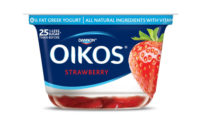FROM THE COLD CORNER
Maple Hill Creamery Using USDA Grant to Promote Regenerative Dairy Farming
In honor of National Dairy Month, From the Cold Corner sits down with Tim Joseph, co-founder of one of the largest U.S. grass-fed organic dairy companies.


Maple Hill Creamery's grass-fed cows lead a more natural and comfortable life, with an average lifespan three times longer compared to conventional cows. Courtesy Maple Hill Creamery.

Based in upstate New York, Maple Hill Creamery sources its milk from over 130 family small family farms. Courtesy Maple Hill Creamery.

Founded in 2003, Maple Hill Creamery's milk, yogurt, butter and kefir is available at locations nationwide including Whole Foods Market, Sprouts and Natural Grocers. Courtesy Maple Hill Creamery.




What started with 63 grazing cows and a desire to leave a corporate job has grown into one of the largest organic, grass-fed dairies in the U.S.
“I kind of say we were regenerative before it was a word. Back when we started, when you stop feeding grain to cows, you really are then relying on the pastures that you have – your land base itself. &nAnd the only way that you can successfully do that, like, year in and year out financially, is to actually utilize your cows, solar energy and the sun, right?” said Tim Joseph, co-founder of Maple Hill Creamery. “We bought a dairy farm, not even thinking we're going to be doing dairy. The first time I milked a cow was actually after those 63 got off the truck and we put them in the barn.”
Founded in 2003, the company today sources its milk from over 130 small family farms, much the like one the Josephs worked two decades ago. Its milk, yogurt, butter and kefir is available at locations nationwide including Whole Foods Market, Sprouts and Natural Grocers.
“Back when we started not feeding grain to dairy cows was just not a thing. So we turned inward and, and figured it out. And what we figured out was regenerative grazing and how to teach other farmers and that's really been an important thing to Maple Hill from the beginning is, you know – no pun intended – it was a grassroots effort from the farm up,” Joseph said.
Over the years, Maple Hill has shared many of those hard-learned early lessons with other dairy farmers and processors looking to boost sustainability. Highlights of the company’s regenerative farming approach include:
- Actively rejuvenates soil health, enhances water quality and sequesters carbon, to promote a healthier planet.
- Reduces carbon footprint by exclusively feeding its 100% grass-fed cows with organic grass grown on its farm, which also enhances the land.
- Their cows lead a more natural and comfortable life, with an average lifespan three times longer compared to conventional cows.
- Partnering with small family farms to source their milk which supports local economies and helps sustain rural communities.
Maple Hill Creamery, along with other partners, recently received a $20 million USDA grant to lead climate-smart practices among dairy farmers.
The grant will provide participating dairies incentives for climate smart farming with a technical monitoring of factors including soil health and pasture scoring. Much of the grant will fund what Joseph refers to as “pay for progress,” a way to incentivize farmers.
“The Maple Hill team is working with all our farms that want to take advantage of it and creating baseline surveys of their farms and the practices. And then, over the five years of the grant, as outcomes improve and soil cover and water holding capacity and all those things improve, which is a reflection of increased carbon in the soil, the farmers are paid incentives,” he said. “So, it's really an accelerant. If you farm in this way and you graze in this way and you're adding carbon and all these other things to the soil, which is fertility, all of those create long term cascading effects, both biologically and financially, for that farmer.”
In addition to new packaging expected to roll out later this year, Maple Hill recently added milk farms in Pennsylvania, where its cultured products are produced, marking its first milk rights outside of New York.
To learn more, listen to the complete podcast in the player above or download it wherever you get your podcasts.
Looking for a reprint of this article?
From high-res PDFs to custom plaques, order your copy today!









